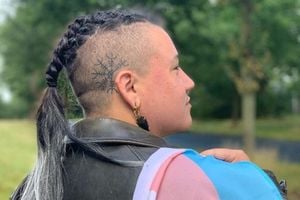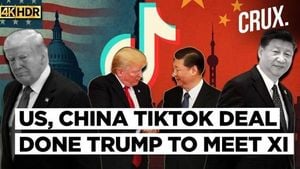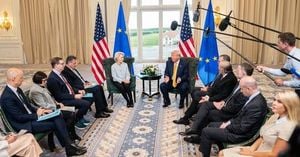In late August 2025, Tumika Alston, a businesswoman and co-owner of Best Tobacco & Wireless in Washington, D.C., found herself at the center of a national controversy following a traumatic robbery at her store and the subsequent use of her story in a White House media campaign. The incident, and the political storm that followed, has spotlighted not just the challenges facing small business owners in the city, but also the deep divides over law enforcement, federal intervention, and the use of personal stories for political messaging.
The trouble began when a group of teenagers stormed Alston’s 24-hour convenience store in Northeast D.C., breaking down the door, ransacking the shelves, and stealing thousands of dollars’ worth of merchandise. Frustrated and overwhelmed, Alston spoke candidly to a local ABC affiliate, expressing her anger and desperation. “I’m telling Trump, yeah, send the boys to Benning Road,” she said, referring to then-President Donald Trump’s recent declaration of a ‘crime emergency’ in the city and his deployment of federal personnel to patrol D.C.’s streets, as reported by the Washington Post.
Alston’s comments, delivered in the heat of the moment, would soon take on a life of their own. Just days after her interview aired, she received a call from an unknown number, which, to her surprise, claimed to be from the White House. The caller expressed concern about the robbery at her store and asked if they could visit. Alston agreed, hoping the visit might result in increased security or a greater police presence in her neighborhood, which continues to suffer from frequent gun violence and property crimes despite overall crime declines in the city.
But when the White House team arrived, Alston was disappointed to find they were armed only with cameras. “He told me, ‘Oh, don’t worry about it. We got your back.’ This, that and the other, and y’all ain’t got my back. I said, ‘Y’all is trying to use me,’” she later recounted to the Washington Post. The following day, her interview and videos of her store were broadcast across White House social media accounts on TikTok, YouTube, and Instagram, reaching nearly 13 million people. The caption on the video read: “Tumika’s story is just one of many the Fake News isn’t reporting.”
Alston was shocked and dismayed by the portrayal. The video’s dramatic music and editing, she felt, made her seem overly emotional and frightened. “They make me sound dramatic, like I was crying,” she said. “Like, what the hell? They trying to make a Tubi TV movie?” Her sense of being used as a political prop only deepened as the video was widely shared and commented on. “I feel like they’ve used me to put that story out there just for the narrative, to use it for an excuse, for more troops to be out there harassing people,” Alston said. “I want them to take that video down, I really do.”
The White House, for its part, defended its actions and the ongoing federal intervention in D.C. “Like many D.C. residents, Tumika has experienced firsthand what happens when criminals are allowed free rein of a city with no consequences,” a spokesperson said. “President Trump’s crime crackdown has significantly driven down violent crime in the city and will help business owners like Tumika. The White House is proud to showcase her story, as well as other D.C. residents, who are directly impacted by the President’s successful efforts.”
Yet, the broader context paints a more complicated picture. President Trump’s declaration of a crime emergency on August 11, 2025, marked an extraordinary exertion of federal power. Invoking Section 740 of the Home Rule Act, he assumed control of the D.C. police department and deployed the National Guard to the streets, as detailed by The Washington Post. The move was met with immediate protests near the White House and sharp criticism from Mayor Muriel E. Bowser, who described the actions as “unsettling and unprecedented” but also acknowledged the potential benefits of a boosted federal law enforcement presence. The police union, for its part, supported the surge.
In the weeks that followed, the effects of the federal takeover rippled through the city. Camouflage-clad National Guard troops patrolled the Metro, and federal immigration officers conducted high-profile operations, sometimes seizing people from their homes and cars. The White House boasted of more than 2,100 arrests and over 200 gun seizures, and fifty homeless encampments were cleared. Trump himself touted the operation as a model for other cities, writing on Truth Social, “Washington, D.C. IS A SAFE ZONE IN JUST A MATTER OF WEEKS. Thank you, President Trump. Who’s Next???”
But not all residents were convinced. According to a Washington Post-Schar School poll, about 8 in 10 D.C. residents opposed the federal takeover of the city’s police and the presence of federal troops on local streets. Civic opposition was visible in protests, signs warning of immigration checkpoints, and public criticism from local leaders. Mayor Bowser, while acknowledging some reductions in homicides, gun crimes, and carjackings, also described a “break in trust” between police and the community and questioned the efficiency of out-of-state National Guard deployments.
Meanwhile, the political battle over D.C.’s autonomy escalated. The House Oversight Committee and the Justice Department launched investigations into the city’s crime data, and D.C. Attorney General Brian Schwalb filed lawsuits challenging the legality of the federal intervention and the use of National Guard troops for law enforcement. Del. Eleanor Holmes Norton, representing the District in Congress, argued, “No emergency exists in D.C. that the president did not create himself.”
For Alston, the aftermath of the robbery has been a mix of ongoing anxiety and a sense of betrayal. After the initial looting, more teenagers returned for a second attempt, though they were unsuccessful. She and her husband, Sajib Uddula, who opened their store earlier in 2025, have since become more cautious about what they display and how they operate. The police investigation into the robbery continues, with no arrests made as of early September.
Alston’s community, too, has warned her to be wary of being used as a pawn in larger political narratives. “My community kept saying, ‘Be careful, girl. Be careful, because they’re probably using you as a pawn,’” she said. The experience has left her wary of both the dangers on her doorstep and the political forces eager to use her story for their own ends.
As Washington, D.C. continues to grapple with the fallout from the federal intervention, the voices of residents like Tumika Alston serve as a reminder of the real human stakes behind the headlines and the ongoing debate over who gets to control the city’s future.



